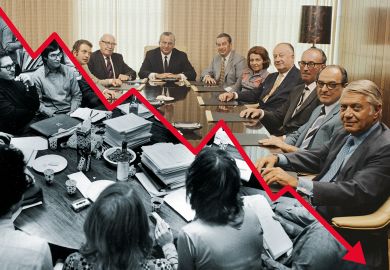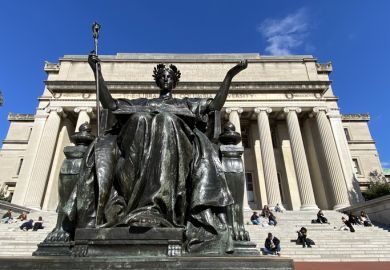To be accused of uttering propaganda is to be affronted. Propaganda is supposed to be an affair of huge posters: a dictator bawling into a microphone while the massed crowds roar their approval.
Not now it isn’t. The change was identified half a century ago by the sociologist Norbert Elias in his forgotten classic, Power and Civility. The massive display of boots and tanks has been replaced by calm and confident iteration in the mouths of rulers and their judicious interpreters in the media.
We can understand today’s propaganda as a highly simplified, softened picture of the political process. The absorption of a fearful shock, the easy evasion of charges of incompetence, the dissolving of sheer cruelty and maleficence into serene necessity: all of this is accommodated within a narrative system framed as the normal conversation of culture. The facts speak for themselves, and speak irrefutably of how things are and how they have to be.
These social instructions have been wholly internalised by what is surely the most docile and obedient polity in the world. The social democratic settlement of 1945 was signed by a well-informed and participant nation. Its gradual disintegration after 1979 at the hands of Margaret Thatcher and the new economic sages has been directed by a minority that stood to profit and by a majority that settled for the modest freedoms and possessions of consumerism.
The propaganda system simplistically depicts the state as the benevolent protector of these freedoms, obliging it ensure we “live within our means”, “take back our country’s borders”, promote “strivers” and punish “shirkers”. While this vast historical manoeuvre has, in the UK, been directed most energetically by a wealthy, privately educated elite in the South of England, no eager Leftist can pretend that it has been carried through without popular assent, much helped by indifference.
In these grim circumstances it is required of universities that they become adjuncts of the dominant saints in this liturgy: consumer choice, individual mobility and the unhampered movement of capital. Careful policing is introduced around those segments of culture – such as teaching and research – formerly ignored as unamenable to profit but now redefined as potentially useful for development. So into university curricula are brought topics relevant to the obliging students of the new order, such as sport, sex, business itself, media, social policy, remedial psychology, the theory of risk.
Bringing off this rewriting of intellectual endeavour takes a good deal of quiet-voiced bullying of once critically minded staff. Hence the grinding insistence on minutely detailed timetable reports, the abominable waste of effort and intelligence on research proposals whose sole purpose is to bring home the cash, the ridiculous “excellence frameworks” and, of course, the disciplining of students themselves by compulsory and lifelong indebtedness.
Propaganda has naturally been busy in effecting these changes, but bloody old power has also had its way with universities. It has coerced an uncoordinated workforce into dull acceptance of disgusting new shapes of intellectual life. Any staff member can tell of the distortions and monstrosities made of the principles of disinterested inquiry and the moral judgements regarding social purpose and historical change that gave academic life its meaning and value.
Fine books and stirring essays about this decline have been published these past few years, which can stand for an as yet undestroyed tradition of dissent and restoration. But the doctrine of university profiteering, of training students to be the machine-minders of capitalism and of exploiting knowledge and thought as marketable commodities, is trampling out the vintage where the grapes of wrath are stored.
University teachers have never been any good at coordinated action. Moreover, the rank and file have been fatally betrayed by ludicrously overpaid and be-knighted vice-chancellors, who really could act together to oppose the shameful reduction of higher education to the lapdog of the Department for Business, Innovation and Skills.
The hideous birds of the future – climate change, recession, famine, plague, war – darken the sky. It will need more than good books to recover the lost honour of the life of the mind.
Fred Inglis is honorary professor of cultural history, University of Warwick.
POSTSCRIPT:
Print headline: Plausible nihility
Register to continue
Why register?
- Registration is free and only takes a moment
- Once registered, you can read 3 articles a month
- Sign up for our newsletter
Subscribe
Or subscribe for unlimited access to:
- Unlimited access to news, views, insights & reviews
- Digital editions
- Digital access to THE’s university and college rankings analysis
Already registered or a current subscriber? Login








